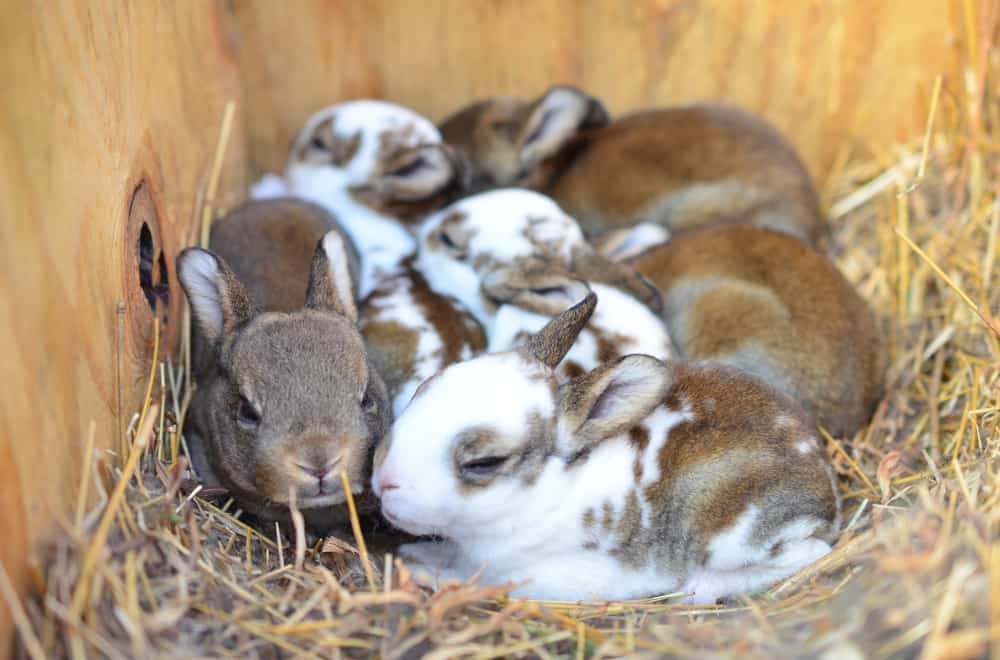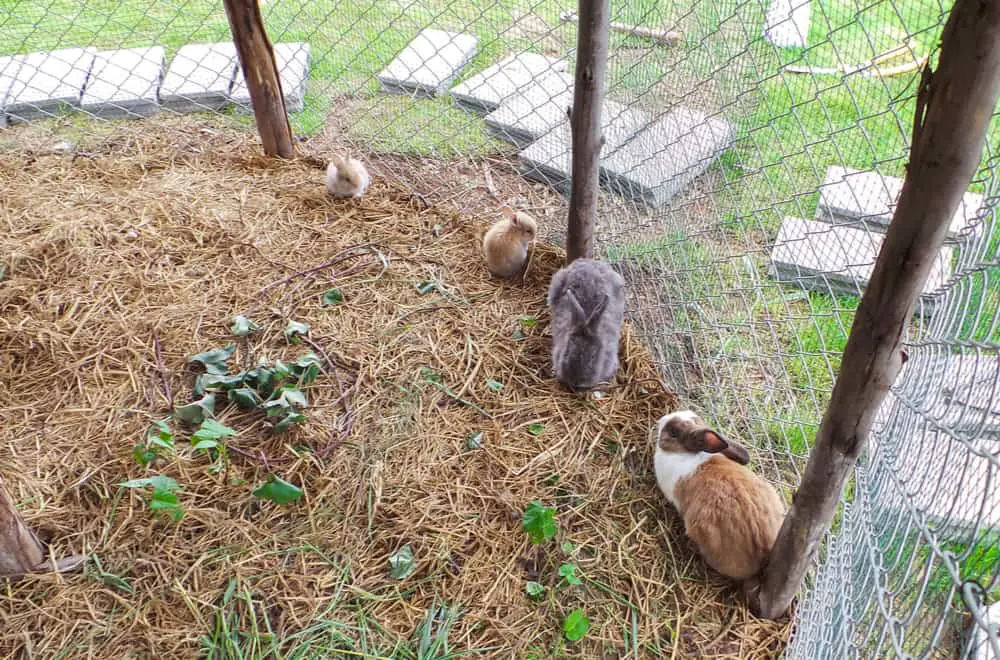Are rabbits born blind? Yes. You can see that kits always have their eyes tightly closed immediately after birth. These tiny creatures are born blind because their eyes continue to develop outside their mother’s uterus.
The process finishes in about two weeks when your baby rabbits open their lovely eyes and start watching the world they are coming to. You should be careful with kits during that period since they are entirely helpless without their eyesight. Even after that period, these cuddly creatures need time to start using them.
Table of Contents
Why Are Baby Rabbits Born Blind?
During these first days, kits’ blindness protects them and their moms. It is vital to avoid trying to open their eyes by force before it happens naturally.
Otherwise, rushing this process will hurt these tiny creatures and cause irreparable damage. Such a thing will prevent the completion of eye development forever and leave baby bunnies blind for the rest of their lives.
Developmental stage in rabbits |
|
| Trait | Age |
| Ears opening | Five days |
| Fully furred | 7 to 10 days |
| Eye-opening | 10 to 12 days |
| Eating solid food | Three weeks |
| Fully weaned | 1.5 months |
| Sexual maturity | Females with four months
Males with five months |
Kits are born with eyes closed for several reasons, but two are crucial. Let’s take a look.
For a rabbit mom’s sake
Pregnancy in rabbits is relatively short and lasts approximately a month with slight variations, depending on the breed. Mom rabbits are exposed and easily accessible to predators during that period, so nature shortened the procedure to protect them in the best possible way.
One of the most practical ways to keep rabbit moms alive is by speeding up the gestational process. That way, they become fast and movable again, can escape in case of danger, and take care of kits living outside their bodies.
For kits’ protection
Eyes are unnecessary organs for kits during the first days of life while lying protected in the litter. Therefore, these tiny creatures develop more crucial body organs first, while eyes wait their turn for 10 to 12 days on average.
There is one more advantage of such an organized order. Baby bunnies are pretty mischievous while young, and it is highly likely that they injure their eyes during the first days of life. Their blindness prevents them from excessive moving and consequent eye injuries.
Moreover, bad weather conditions, including strong wind and bright lights, can’t hurt the eyes’ underdeveloped tissue when the eyelids are closed. As long as their eyes are tightly closed, there is no danger of blindness, which is fatal for these animals.
When Kits Start Seeing?

Most kits need 10 to 12 days to open their eyes, but this process can last up to 21 days, depending on breed and individual characteristics. However, they can’t see far for a while, even after their eyes are fully opened.
The reason is insufficient eye development in that initial period and continued vision developing even after opening both eyes. Therefore, baby rabbits will stick to their litter and be satisfied to see their siblings and mother.
Once their eyes are fully open, your babies will begin fine-tuning them by practicing. They will alternately focus on close and distanced objects to strengthen eye muscles and prepare eyes for future sharp eyesight.
You will know when the kits’ sight has improved since they will immediately become active and curious.
Unlike the weakness they feel during the first three weeks of their life, their vision becomes excellent over time. Therefore, they suddenly become strong and confident enough to start exploring their surroundings.
Reasons Why Kits Don’t Open Eyes

In rare cases, some kits won’t open their eyes after two to three weeks. It is always a sign that something is wrong, without exception. Healthy rabbits always open their eyes within this period, so any deviation is a sign of some pathological problem. Some of the possible reasons include:
- Infection by Streptococcus spp. or Staphylococcus spp.
- Injury during or after birth
- Mother rabbit’s illness
- Malnutrition
- Inability to nurse
- Poor quality milk
- Congenital defects (stuck eyelids, eye issues, and optic nerve damage)
- Underdevelopment (brain and nervous system deformity), typically caused by early birth
All these reasons cause an eye-opening delay, which can lead to permanent vision impairment and blindness in some cases. That is a reason why mom rabbit’s diet is crucial. Only healthy, well-nourished, and adequately maintained rabbits can produce healthy offspring.
On the other hand, breeders need to pay attention to hereditary causes of such a condition. Since congenital deformities are recessive traits passed from parents to offspring, it is vital not to use rabbits with such genes in further breeding.
Helping kits open their eyes
Never try to open the kit’s eyes by force, no matter how much time has passed since birth! Be aware that such a reaction can’t help your baby rabbit but can hurt it and cause irreparable damage.
Even though your kits’ eyes are closed for more than two or three weeks, every attempt to open them can halt development and severely damage delicate eyeballs. The only thing to do is to take rabbits to the vet for professional help.
Only the vet can decide whether it is safe to try to open eyelids. The procedure will depend on the cause, including the most often:
- Conjunctivitis – It is a common health issue in kits, and your vet will wipe away crusts and apply antibiotic lotion when your kits have problems with this inflammation.
- Eye infection – In this case, you can apply antibiotic lotion on your kits’ eyes daily until the eyelids open.
- Genetics – Some kits are genetically different from others and need more time to open their eyes. In this case, the only thing to do is to wait a few extra days and protect the little fellow from bullying.
Non-opened eyelids treatment
While no one can do something when bunnies don’t open their eyes because of congenital defects and nervous system deformity, your vet can help with infections. A timely reaction will increase your pet’s chances of getting over the problem.
Kits typically come into contact with Streptococcus spp. and Staphylococcus spp. during parturition, while passing through their mom’s genital system. In some cases, these bacteria are in their litter, particularly when they come into this world during a cold season.
If you notice that one or more kits have eyelids pointing outwards, it is almost always a sign of inflammation or pus accumulation under them. In the beginning, your baby rabbits have a chance to recover, but neglecting them will affect deep eye structures.
As soon as you take your babies to the vet, they will get timely treatment, increasing the chances of total healing. Sometimes, it will be necessary to open eyelids manually, but it is a delicate procedure. Therefore, it would be wise to leave it to a professional.
There is one more thing! Always be careful when noticing one baby rabbit with eye issues. It is almost impossible that it is an isolated case, and you should take all the litter to the vet for a thorough examination.
Blindness In Rabbits

You should be aware that bunnies can be blind, although they open their eyes on time and without visible problems. Sometimes, kits with bright, clear eyes are born blind because of a damaged optic nerve or congenital deformities.
Therefore, you should test your newborn baby rabbits by leaving them in unfamiliar surroundings. It is crucial to wait for a while and check their ability to orient themselves. Only those with undisturbed vision can find their way to the litter.
Unfortunately, confused and disoriented babies that bump into obstacles are probably blind or have difficulty seeing. Such kits also never react to your movements and have problems approaching their mom for feeding.
Caring for a blind rabbit
Once your rabbit matures, it can get blind because of various reasons, including:
- Untreated eye infections
- Abscess
- Cataracts
- Glaucoma
- Trauma or enucleation
- Parasites (Encephalitozoon cuniculi)
- Tumors
- Age
If you decide to take care of a blind bunny, you should follow a few crucial guidelines. First, it is wise to contact your vet regularly to check the rabbit’s condition.
Second, it will be necessary to make some changes in your home and adapt it to allow your pet free and undisturbed moving. One of the vital things is to keep the environment consistent to minimize its stress level.
Never relocate your bunny’s water and food bowls and a litter box, and keep them in a safe place without obstacles. Give your best to maintain a routine and feed your pet at the same time every day, helping it feels secure.
You should also avoid wearing intense perfumes and using scented candles inside your home. That will make your rabbit’s life easier since blind ones rely only on their sense of smell.
Unlike blind wild rabbits with no chance to survive, blind pets can adapt to existing circumstances and live happy lives. They only need a little of your effort and support.
Summary
Kits are born blind, so you should be careful and care for these delicate creatures, particularly during the first ten to twelve days. That is a period necessary for their eyes to finish the development process before these cuties can start using them. Since they are also deaf and naked, leaving them unprotected in that early period can be fatal.
